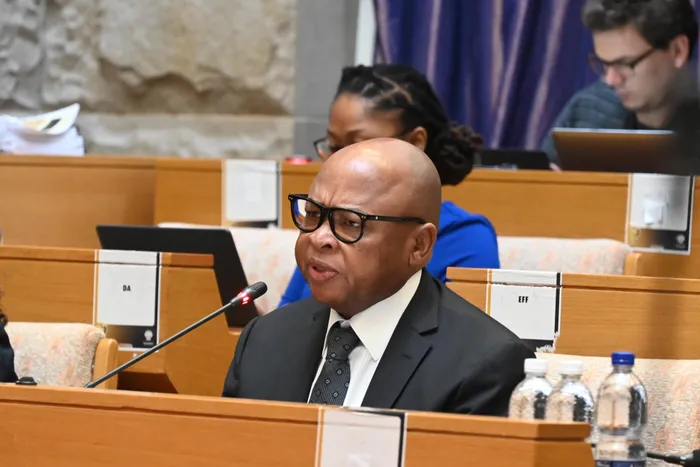READ: Five highlights from deputy police Minister Cassel Mathale’s testimony

Deputy Police Minister Cassel Mathale Contradicts Suspended Minister on Police Task Team in Parliament Hearing
Image: Ayanda Ndamane / Independent Media
Deputy Police Minister Cassel Mathale appeared before Parliament’s ad hoc committee investigating allegations of corruption and political interference in South Africa’s criminal justice system.
His testimony shed light on the internal dynamics within the police ministry, particularly in relation to the suspended Police Minister, Senzo Mchunu, the controversial Political Killings Task Team (PKTT), and the functioning of the department under multiple deputy ministers.
No Delegation from Suspended Police Minister Senzo Mchunu
Since their appointments by President Cyril Ramaphosa last June, Mathale revealed that Mchunu had not delegated any specific responsibilities to him or fellow Deputy Minister Polly Boshielo.
Mathale attributed this to Mchunu still familiarising himself with his role in the ministry.
“The minister is still getting to grips with his role, and no tasks have been assigned to me or Deputy Minister Boshielo,” Mathale told the committee.
When asked about his daily duties despite the lack of delegation, Mathale clarified, “We have a monthly program outlining our activities in advance.”
He added, ”Not having delegated responsibilities doesn’t mean we have none — I often coordinate with the civilian secretariat, different police divisions, and handle various issues relevant to the ministry.”
Dispute Over the PKTT’s Existence and Costs
A significant portion of the hearing centered on conflicting accounts from the Political Killings Task Team (PKTT).
Two weeks prior, Mchunu had claimed the PKTT was an expensive burden on the South African Police Service (SAPS) and suggested the unit’s mandate had expired after 2022.
Mathale vehemently disputed these assertions, pointing to former Police Minister Bheki Cele’s extension of the PKTT mandate in 2023 as proof of its continued legal status.
“When it comes to regular expenditure for the PKTT, such costs can only arise if the unit operates legally. If its existence were illegal, any expenditure would also be illegal,” Mathale explained firmly.
“At no stage did the PKTT operate outside any legal framework, and I am not aware of any time when it was not supposed to exist.”
Complex Policing Structure Requires Multiple Deputy Ministers
Acknowledging the police department’s complexity, which includes several specialised divisions—such as five units within the Directorate for Priority Crime Investigation (DPCI) and a civilian secretariat—Mathale defended the necessity of having multiple deputy ministers.
“Yes, there is a need and necessity for deputy ministers in this department. It’s not like other ministries; SAPS has multiple entities that function almost as departments within the department,” he said.
He added, “Effective oversight requires additional leadership.”
“That said, delays in ministerial appointments do not mean the department can function without a minister.”
Ministerial Authority Behind the Letter to Disband PKTT
Mathale shed light on the controversial letter instructing National Police Commissioner Fannie Masemola to disband the PKTT.
According to him, the decision was initiated by the minister and communicated to the portfolio committee on March 5 as part of a transitional phase.
“In the meeting earlier this year, the minister presented to the portfolio committee that the PKTT was to be disbanded during a transitional period,” Mathale said.
“Although the national commissioner may physically present documents, it is the minister’s decision as the executive authority. The letter was part of this process.”
He added that the letter’s issuance was what prompted the ad hoc committee’s formation.
Collaboration Seen as Key to Improving Policing
Pressed by Democratic Alliance MP Glenys Breytenbach on a delegation from acting Police Minister Firoz Cachalia, Mathale responded, “We have met and spoken about it, but no delegation.”
When asked by ANC MP Mdumiseni Ntuli about potential improvements he would implement if he were Police Minister, Mathale emphasised the critical role of communication and teamwork:
“Working together with the national commissioner and having regular meetings would make things easier. We have huge responsibilities, and consistent communication is essential.”
The ad hoc committee continues with its investigations, with Mathale set to continue his testimony on Wednesday.
IOL Politics
Get your news on the go. Download the latest IOL App for Android and IOS now.
Related Topics: